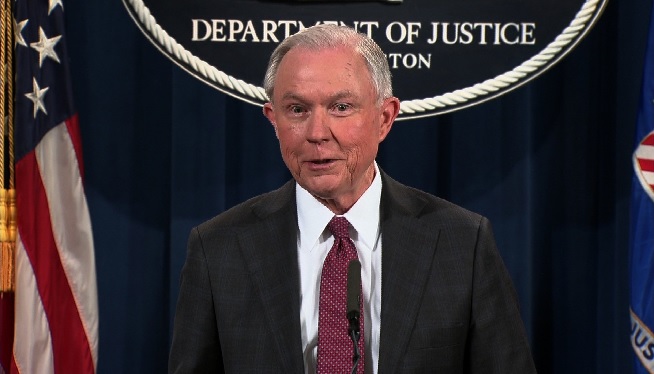WASHINGTON — (CNN) Attorney General Jeff Sessions has a new directive for federal prosecutors across the country: charge suspects with the most serious offense you can prove.
Friday’s announcement follows a line of several other significant departures from Obama-era domestic policies at the Justice Department, but this decision crystalized Sessions’ position in the criminal justice realm.
In a brief one-and-a half page memo, Sessions outlined his new instructions for charging decisions in federal cases, saying that his new first principle is “that prosecutors should charge and pursue the most serious, readily provable offense.”
“The most serious offenses are those that carry the most substantial guidelines sentence, including mandatory minimum sentences,” Sessions later adds.
While the federal sentencing guidelines are advisory — and take into account everything from a defendant’s criminal history to cooperation with authorities — some judges have felt handcuffed by mandatory minimums, which provide a statutory sentencing minimum of months below which the judge cannot depart.
Sessions also formally withdrew a signature part of Attorney General Eric Holder’s “Smart on Crime” initiative, which sought to target the most serious crimes and reduce the number of defendants charged with non-violent drug offenses that would otherwise trigger mandatory minimum sentences.
[van id=”politics/2017/04/13/jeff-sessions-agenda.cnn”]
“We must ensure that our most severe mandatory minimum penalties are reserved for serious, high-level, or violent drug traffickers,” Holder wrote in a 2013 memo. “In some cases, mandatory minimum and recidivist enhancements statutes have resulted in unduly harsh sentences and perceived or actual disparities that do not reflect our Principles of Federal Prosecution.”
As a result, during the Obama era, federal prosecutors were instructed not to charge someone for a drug crime that would trigger a mandatory minimum sentence if certain specific factors were met: (a) the relevant conduct didn’t involve death, violence, a threat of violence or possession of a weapon; (b) the defendant wasn’t an organizer, leader or manager of others within a criminal organization; (c) there were no ties to large-scale drug trafficking operations; and (d) the defendant didn’t have a “significant” criminal history (i.e., prior convictions).
All of those charging factors are now gone under Sessions’ reign and not surprising, as he has previously telegraphed his desire to prosecute more federal cases generally.
The effects of Friday’s decision are likely to be felt most immediately in the narcotics context where federal mandatory minimums established by Congress can be harsh for even first-time offenders because the sentences are dictated based on drug type and quantity.
The-CNN-Wire ™ & © 2017 Cable News Network, Inc., a Time Warner Company. All rights reserved. (PHOTO: Pool/CNN)





















